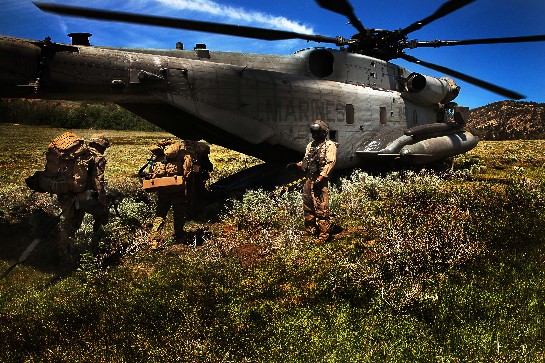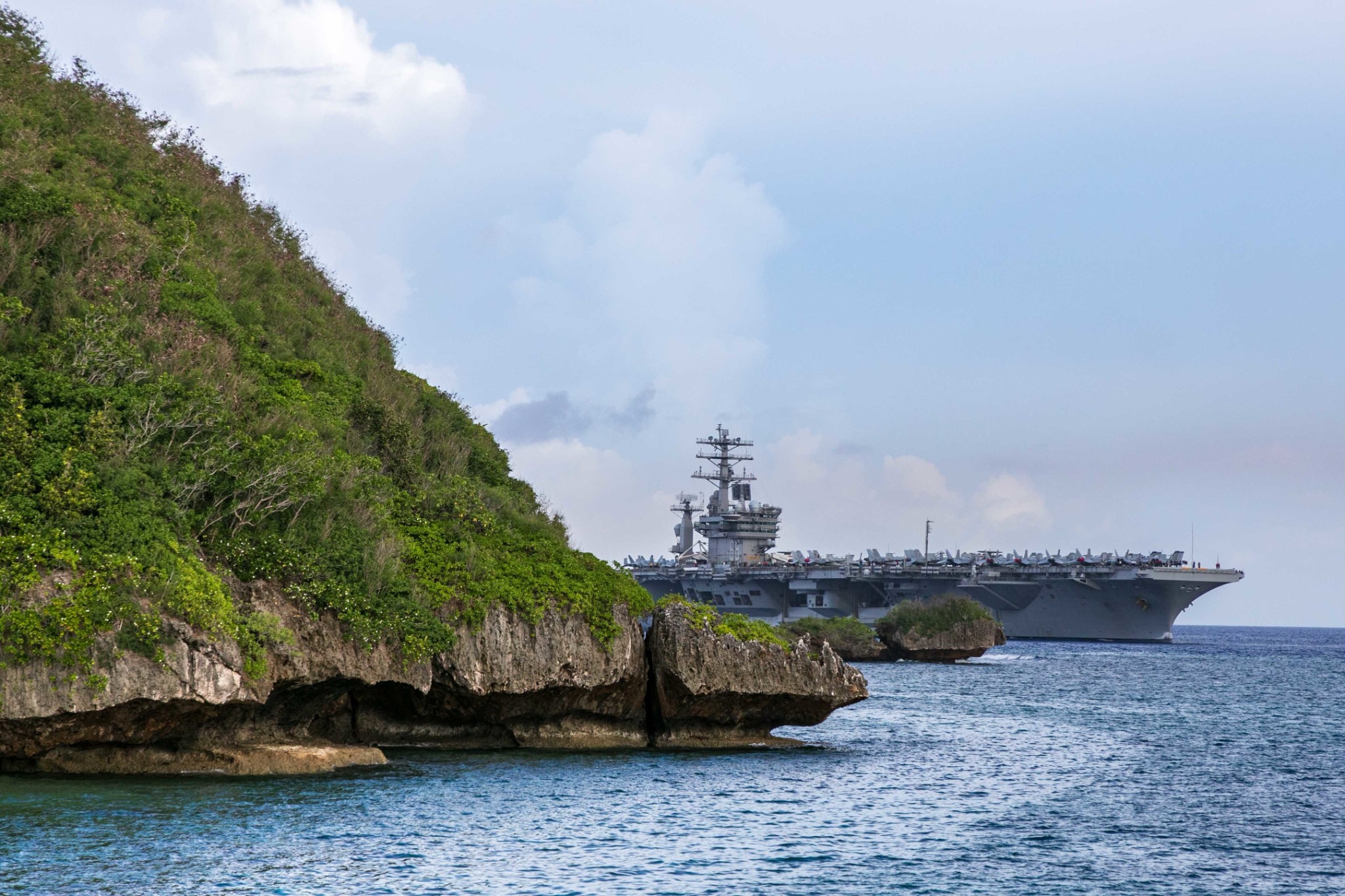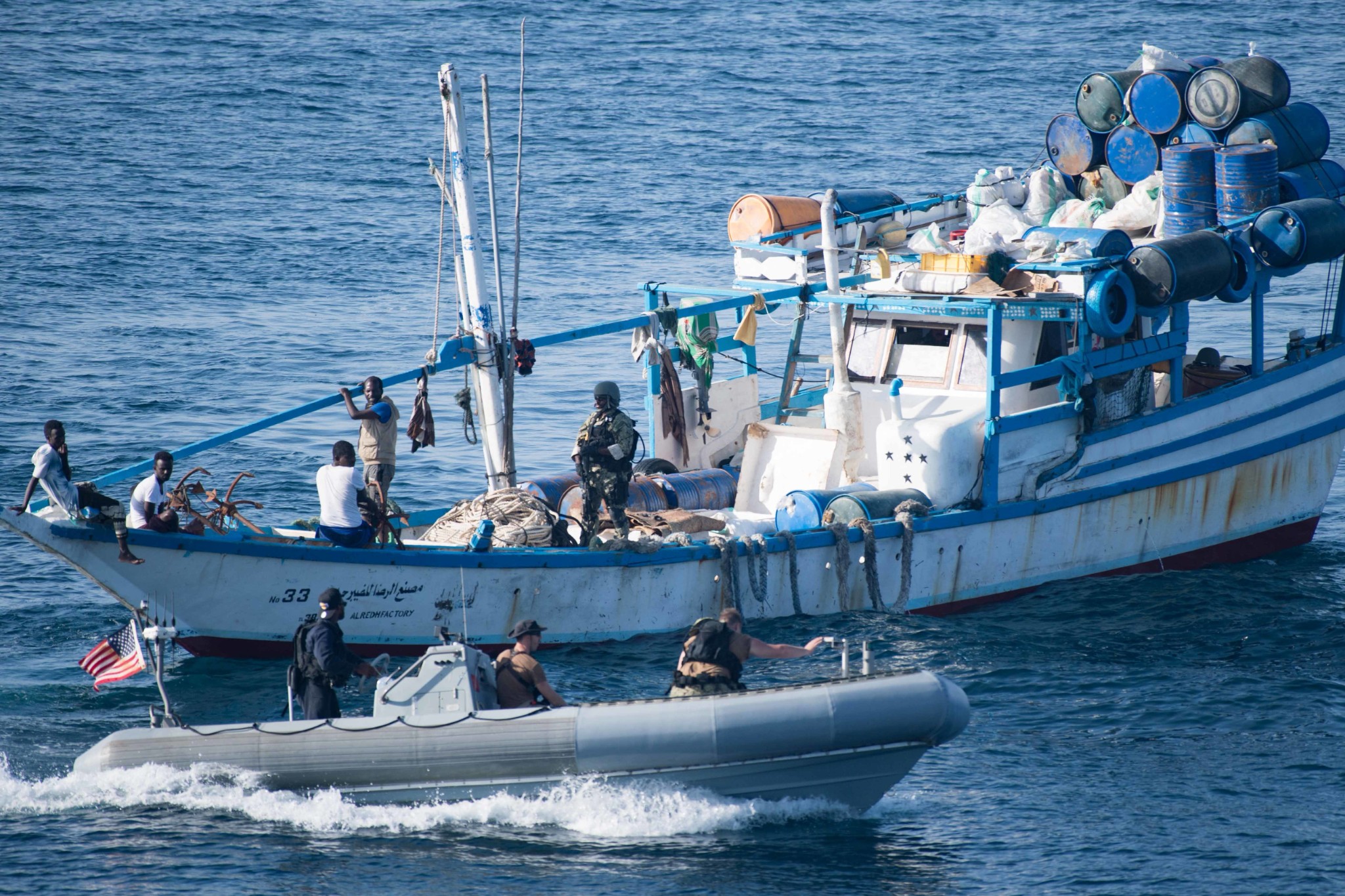-
American Competitiveness & Economic Diplomacy
Our ability to compete in a global economy, attract the world’s brightest workers and nurture a functional political system is slipping.
This weakness is now at a point where it threatens to erode the pillars upon which America’s national security rests.
America’s competitiveness is now a matter of national security.
We need to acknowledge that current policies and objectives in the public and private sector, taken together, dangerously undercut America’s current and future global position through instability, inefficiency and risk.
America’s political and business leaders must understand that improving our nation’s competitiveness is an urgent priority with much higher stakes than is acknowledged today.
Read More »
-
ARCTIC
Why is the Arctic Important?
Climate change is altering the physical and security landscape in the Arctic. The Arctic is warming at twice the rate of the rest of the planet, and much faster than many climate scientists expected. Arctic sea ice has steadily declined over the last 30 years, and the ice cap has retreated roughly 40 percent. The melting of sea ice has prompted the nations with Arctic Ocean coastlines—the United States, Canada, Russia, Norway, and Denmark (Greenland)—to reassess their interests in the region, while driving interest from countries as far away as China, India, or even Singapore.
Many experts believe that climate change, coupled with technological advances and rising global demand for resources, may uncover vast economic potential in the Arctic. An Arctic free of ice could mean billions of dollars in investment for energy production, shopping, and fishing. However, the melting ice will also create new security concerns, as countries like China and Russia increase their regional military presence. It is important that the U.S. assume a leadership position, and assist Arctic nations in developing rules and norms for the unique challenges the region poses.
ASP’s Arctic research aims to better understand the challenges and opportunities of an opening Arctic. The research will focus on three major areas: great power competition, climate and energy security, and American competitiveness and leadership.
Great Power Competition
The 2018 U.S. National Defense Strategy established “great power competition” as the top priority for the Department of Defense. The strategy clearly labeled two states–China and Russia–as the primary competitors to the US. China’s and Russia’s interests in the Arctic are well known. How the U.S. navigates an opening Arctic in the face of great power competition will define American national security strategy in the coming decades.
Climate and Energy Security
The Arctic is a new security domain because of climate change. The opening of the Arctic means there will be more maritime traffic, more resource exploration, and more military investment. That means that the U.S. military should invest in projecting power, ensuring freedom of navigation, and strategic communication systems capable of operating that far north.
An ice-free Arctic also means the exposure of undeveloped natural resources. Due to advancements in technology, deep seabed drilling for oil and natural gas in the Arctic is now technically possible. Minerals and other natural resources may provide strategic value for U.S. military weapons and electronics development. It is important, however, that the U.S. not rush to develop these resources before rules for the road are established.
American Competitiveness and Leadership
An opening Arctic provides ample business opportunities for American companies. It is critical that American companies demonstrate stewardship of the Arctic and establish best practices for commerce, tourism, and natural resource exploration. In doing so, American companies demonstrate leadership and can ensure the Arctic is developed safely and ethically.
The Arctic has moved to the center of world affairs, even if policymakers don’t know it. What was once a frozen ocean is now a venue for oil and mineral exploration, cargo transit, and even tourism. The Arctic should not become the Wild West. The U.S. must assume leadership to ensure the Arctic is not militarized, is used safely, and developed ethically. If the U.S. is not engaged and leading the way, another country–Russia or China–will, undermining U.S. national security.
Additional Resources
FACT SHEET: Arctic Climate and Energy
REPORT: Climate and Energy Security in Alaska
REPORT: America’s Role in the Arctic: Opportunity and Security in the High North
ASP’s Holland Testifies about the Arctic before House Foreign Affairs Committee
Press Hits
ASP COO Andrew Holland in High North News
ASP COO Andrew Holland in Raconteur
Read More »
-
Asymmetric Operations
United States faces many challenges around the world that are complex because they are asymmetric in nature. Asymmetric challenges are those where the different players and components have different interests, resources, and capabilities, but nevertheless interact in complex ways to make policy extremely difficult.
At the American Security Project, we think navigating asymmetric challenges begins with a clear articulation of U.S. interests. From there, the role American power should play becomes clear, and from understanding that role we can craft good policy to support our interests. Without dogma or partisanship, we seek long term solutions to the challenges facing the nation.
There are many different ways ASP understands and analyzes asymmetric challenges and operations effect national security.
Read More »
-
China Policy and Strategic Competition
China Policy and Strategic Competition
Amidst escalating great power tensions, the United States and China engage in strategic competition over global influence, economic markets, military capacity, and technological advancement. As China strengthens its defense capabilities and makes new agreements with Russia, the U.S. must carefully navigate its potential to reshape global norms and institutions so that it can ensure its own security and that of its allies. By implementing strategies that balance accountability with adaptability, the United States can safeguard its interests while fostering stability and prosperity across the world.
Read More »
-
Climate Security
Climate Security is a core component of U.S. national security. It exacerbates existing threats, risks, and hazards while simultaneously creating new ones. These climate risks act as an accelerant of instability and a threat multiplier, especially in fragile states. ASP has been at the forefront of the climate security discussion with our flagship program, the National Climate Security Tour, for more than a decade, and is continuing our work highlighting climate security concepts through the Climate Security in Focus blog series. ASP remains dedicated to fostering dialogue and enhancing climate security conversations, and regularly engages with stakeholders, communities, and strategic partners to identify areas for collaboration and cooperation.
ASP's climate security work is focused on seven key risks/hazards, with particular interest in how they directly impact U.S. military readiness, operations, training, and resilience:
- Increase in extreme weather events and weather-related disasters
- Sea-level rise and coastal degradation
- Water security
- Food security
- Public health
- Climate related migration
- Combating violent conflict
ASP has several related lines of effort, including the electric vehicle transition, climate considerations in the NDAA, and illegal, unreported, and unregulated (IUU) fishing. If you're interested in learning more about any of ASP's climate security work and/or partnering for an event, please email us at info@americansecurityproject.org
Read More »
In addition to producing thought leadership and convening stakeholders for important discussions about climate security, ASP recognizes the threats posed by climate change and is committed to being a good steward of the natural environment through sustainable business practices.
Read More »
-
Cuba Engagement
After the landmark meeting in Havana between President Obama and Raul Castro, it is tempting to say that the process or re-establishing of a relationship with Cuba is complete. But 55 years of history cannot be simply forgotten – and elements on both sides of the Florida Strait have incentives to throw up roadblocks to further engagement.
ASP looks forward to helping build a closer relationship between the governments of the United States and Cuba. Even more importantly, ASP hopes to build a long-lasting relationship between the people of the United States and the people of Cuba and overcome challenges separating both countries.
Read More »
-
Egypt Strategic Partnership
“Egypt’s political and economic success is important, of course, not only for Egyptians, but it’s important for the region, for the United States, and the international community.” - John Kerry, Secretary Of State
Egypt is the most populous and traditionally one of the most influential countries in the region. The United States has had long-term military, cultural and economic links with the country.
Recently, due in part to lack of knowledge and understanding of political change in Egypt, that relationship has faltered.
Read More »
-
Energy Security
How the United States uses and produces energy is a national security issue

Energy refers to everything from fossil fuels, like oil and gas, to renewable energy sources, like wind and solar power, and the infrastructure that underpins them, like the national grid and energy storage. Energy security is a function of availability, consistent access, and predictable pricing. Energy becomes a national security and foreign policy issue when energy insecurity affects a country's governing policies. The United States can ensure energy security by diversifying energy sources, ensuring domestic production, and securing both distribution and access.
‘Energy security’ is not ‘energy independence.’ Not all of the energy used in a country must come from within its own borders. This is neither obtainable nor desirable in a globalized world. In a world of globally traded commodities, it is no longer possible to be truly energy independent: even domestically produced energy sources are subject to fluctuations in global commodity markets.
Over the last decade, the United States has experienced an energy revolution, which has allowed it to increasingly use energy as a tool of statecraft. For example, since 2014 the U.S. has drastically increased domestic oil production, allowing it to greater affect global oil prices. The U.S. has also increased its production of renewable energy. In 2020, renewable energy became the second-most important energy for electricity generation. U.S. efforts in renewable energy position it as a global energy leader as the world moves away from fossil fuels.
Read More »
-
Fusion Energy
 FUSION ENERGY IS REAL. IT’S HAPPENING NOW IN LABS AROUND THE WORLD.
FUSION ENERGY IS REAL. IT’S HAPPENING NOW IN LABS AROUND THE WORLD.
Fusion is energy released by forcing atomic nuclei together—the same process that powers the sun. The primary fuel for fusion is derived from ordinary water.
Electricity produced from fusion will be safe and clean. It offers hope for an ideal energy source, both in terms of our security and our environment. Fusion could be the base of a new 21st Century Industrial base. It has the potential to provide low cost, carbon-free and nuclear proliferation-free energy to all nations.
Will the United States lead in the commercialization of this technology?
Read More »
-
Maritime Security
 (U.S. Navy photo by Chief Mass Communication Specialist Matthew R. White/Released)
(U.S. Navy photo by Chief Mass Communication Specialist Matthew R. White/Released)
The ocean covers more than 70% of the Earth, with more than 80% unexplored. The ocean is vital for many earth processes, including weather and climate, and it is rich in natural resources essential for human survival. Fish account for 17% of the animal protein consumed by the global population and overall provide about 3 billion people worldwide with nearly 20% of their animal protein. Further, about 12% of the world’s population—over 870 million people—depend on fisheries and aquaculture to support their livelihoods. However, fish populations and marine ecosystems are increasingly at risk of exploitation and degradation. Overfishing, climate change, ocean acidification, and habitat degradation threaten already fragile marine ecosystems.
The pressure on the world’s oceans is increasing as global populations rise and technology for exploration advances. Due to modern technology, industrial fishing fleets can fish for extended periods in more remote locations. This technology also facilitates transnational organized criminal activity at sea due to the ease of evading detection and divergent ocean governance structures.
Maritime security refers to maritime or oceanic issues related to national security--marine ecosystems, economic development, and human and food security. Maritime security includes the world’s oceans and regional seas, territorial waters, rivers, and ports.
The issues related to maritime security include illegal, unreported, and unregulated (IUU) fishing and transnational organized crimes: piracy; armed robbery at sea; human, drug, and weapons trafficking; and marine pollution. Maritime security is often global and characterized as being cross-jurisdictional. Due to the challenges of governing global resources, the strategies to protect and secure oceans require collaboration amongst coastal States. In addition, there must be effective international policy with backing from multi-State coalitions to support enforcement mechanisms with solid monitoring, control, and surveillance.
United Nations Law of the Sea
The United Nations Convention on the Law of the Sea (UNCLOS) defines the international parameters for managing all marine and maritime activities. Under UNCLOS, coastal nations have jurisdiction over the natural resources within their Exclusive Economic Zones (EEZs), which extend up to 200 miles offshore. How coastal countries govern the marine resources in these zones may look different; it is ultimately the coastal nation’s responsibility to manage the resources within their EEZs.
The U.S. is party to several effective international agreements to combat IUU fishing, including regional fisheries management organizations (RFMOs) and the Port State Measures Agreement (PSMA). Underpinning international agreements about the ocean is the UNCLOS, which remains unratified by the U.S. However, U.S. forces regularly enforce freedom of navigation principles enshrined in UNCLOS. Every Chairman of the Joint Chiefs of Staff since the adoption of the convention in 1982 has supported its ratification. Ratification of the UNCLOS would strengthen U.S. maritime policy and influence abroad.
 (U.S. Navy photo by Cryptologic Technician (Collection) 3rd Class Joseph Dioso/Released)
(U.S. Navy photo by Cryptologic Technician (Collection) 3rd Class Joseph Dioso/Released)
Illegal, Unreported, and Unregulated Fishing
Illegal, unreported, and unregulated (IUU) fishing activity threatens marine ecosystems by undermining efforts to manage fisheries and conserve marine biodiversity sustainably. Due to challenges in identifying, detecting, and quantifying the scope of IUU practices, this problem has proved difficult to combat.
IUU fishing exacerbates poverty, threatens livelihoods, and fosters food insecurity. These impacts are especially detrimental to developing countries that rely heavily on marine ecosystems for subsistence and employment. Resources derived from IUU fishing are typically exported away from communities already at the margins of society and into developed countries. Once the illegal catch is brought to shore and processed, the fish products are shipped and sold in overseas markets. Between 20-32% of wild-caught seafood in the United States of America is illegal.
Not only does overfishing from illicit actors exacerbate food insecurity, but it also subjects marginalized communities to human rights abuses within the fishing industry, including substandard working conditions and human trafficking. IUU fishing activities pose a significant national security threat by fostering other illicit activities such as money laundering, drug smuggling, illegal arms dealing, and other transnational organized crimes. In 2020, the U.S. Coast Guard identified IUU fishing as the leading global maritime security threat due to the expected deterioration of government authority within fragile coastal states and increased tension between fishing nations. Without U.S. and international efforts to stop illegal fishing, the tension among fishing nations could threaten geopolitical stability worldwide.
Read More »
-
National Security & Climate Change
www.NationalSecurityandClimateChange.org
Helicopter and SoldiersIn 2014-2015, the American Security Project (ASP) is undertaking a grassroots effort to build a consensus among Americans around the country from left to right, and especially among the non-political, that climate change is not simply a low-priority ‘green’ issue: it is a pressing national security threat, and should be treated as such.
Read More »
-
National Security & Space
Competition in space is heating up and a new space race is beginning.
While space has been and can continue to be an area for scientific cooperation, there is a growing risk of conflict developing between space-faring nations. There are also critical threats to American infrastructure in space. Whether communications satellites, GPS systems, or intelligence gathering assets, these are potentially vulnerable to attack. In addition to this, space debris is a growing problem, putting many of America’s space assets in danger.
The U.S. should develop forward looking solutions to manage these threats, while developing policies to help it retain its competitive edge in an increasingly crowded environment.
Read More »
-
National Security Strategy
We live in a time when the threats to our security are as complex and diverse as terrorism, the spread of weapons of mass destruction, climate change, failing states and economic decline.
Many of these national challenges will require responses that go beyond military might and utilize all the tools at our disposal. The American Security Project is leading the development of a new national security vision and strategy that will create a New American Arsenal for the twenty-first century that is responsive to the challenges and opportunities we face as a country.
Read More »
-
Nuclear Security
The spread of nuclear weapons and increasing numbers of nuclear forces worldwide represents the greatest danger to mankind.
Since President Eisenhower first proposed an Open Skies Treaty with the Soviet Union, successive American presidents have sought to advance U.S. nuclear security through international treaties and agreements to reduce the dangers posed by nuclear weapons and to create strategic stability.
ASP seeks to build upon that legacy and educate the public about the leadership needed to build a new international consensus for nuclear security.
U.S. policymakers are taking a serious look at the future of our nuclear deterrent and the size of the nuclear force. Reportedly, the proposals for a 21st century nuclear force ranges from reducing to a few hundred to the status quo deployed force of 1550. Most agree that it’s time to take a hard look the nuclear force the U.S. wants and needs.
Read More »
-
Public Diplomacy and Strategic Communication
The American Security Project defines public diplomacy as:
Communication and relationship building with foreign publics for the purpose of achieving a foreign policy objective.
Public diplomacy is a vital aspect of our national security strategy and must also inform the policy making process. Paraphrasing Edward R. Murrow, President Kennedy's Director of the United States Information Agency (USIA), public diplomacy must be in on the take-offs of policy and not just the crash landings.
In the 20+ years since the end of the Cold War, the United States has yet to establish a defining role for public diplomacy in the context of its foreign relations.
Read More »
-
US-Russia Relationship
With the 2022 invasion of Ukraine, Russia's actions have driven its relationship with United States to a new post-Cold War low.
While the United States has played a major role in supporting Ukraine's defense and uniting much of the world against Russia's invasion, U.S. strategy around Russia will need to be forward looking and oriented to a post-Putin era that doesn't repeat the mistakes of the post-Soviet period.
Russia's hostile actions and malign behavior have positioned it as a revanchist adversary of the U.S., but the challenges of the modern world will still require some cooperation.
America needs a new plan to steer relations with Russia towards the right course. A comprehensive and effective strategy will compel Russia to leave Ukraine, deter future aggression, decrease the risk of nuclear and military confrontation, and work to build closer ties between the people of Russia and the United States.
Read More >>
Read More »


 FUSION ENERGY IS REAL. IT’S HAPPENING NOW IN LABS AROUND THE WORLD.
FUSION ENERGY IS REAL. IT’S HAPPENING NOW IN LABS AROUND THE WORLD. (U.S. Navy photo by Chief Mass Communication Specialist Matthew R. White/Released)
(U.S. Navy photo by Chief Mass Communication Specialist Matthew R. White/Released) (U.S. Navy photo by Cryptologic Technician (Collection) 3rd Class Joseph Dioso/Released)
(U.S. Navy photo by Cryptologic Technician (Collection) 3rd Class Joseph Dioso/Released)



